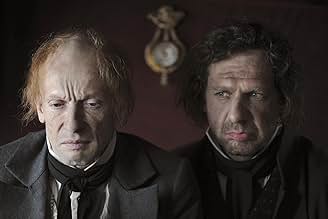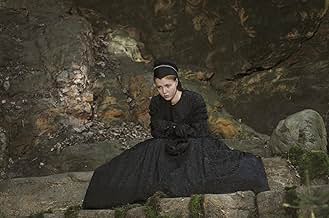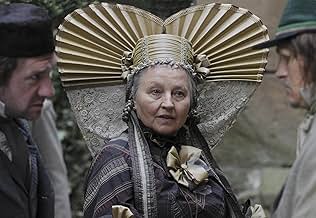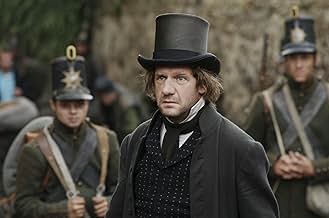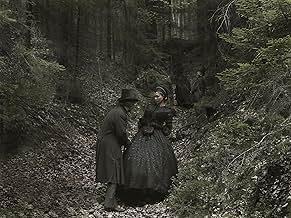VALUTAZIONE IMDb
6,5/10
5909
LA TUA VALUTAZIONE
Uno studioso disperato vende la sua anima a Satana in cambio di una notte con una bellissima giovane donna.Uno studioso disperato vende la sua anima a Satana in cambio di una notte con una bellissima giovane donna.Uno studioso disperato vende la sua anima a Satana in cambio di una notte con una bellissima giovane donna.
- Regia
- Sceneggiatura
- Star
- Premi
- 15 vittorie e 27 candidature totali
Eva-Maria Kurz
- Faust's Cook
- (as Eva Kurz)
Recensioni in evidenza
The way Sokurov treats this story makes it clear that his characters are all immersed in the day tot day doings, the earthly aspects of our lives, and it is hard or even impossible to escape. He brings it home to us, he gets us involved through his camera and sound, Faust becomes us. The first time I know of that this story was told in such a way that we can actually get inside Faust. Sokurov brings home some intriguing themes. Is Faust's soul maybe already missing from the start? What is our perception of Faust's hell and/or heaven, and how easy are we manipulated? We don't seem to need a lot of arguments and talking to win us over...
Aleksandr Sokurov's take at Faust is a courageous act. Yet, my issues with this movie have nothing to do with the discussion whether a Russian director might understand the essence of Goethe's work. This is a futile debate, because Sokurov comes closer to Goethe than an average Westerner to Russian classics, as displayed in Joe Wright's Anna Karenina (2011).
In Faust, Sokurov did what he's done before. There are rather realistic, almost documentary images and there are dream-like sequences. We've seen the former in, for example, the trilogy of Moloch (1999), Taurus (2001) and The Sun (2005). And we've seen the latter in, for example, Russian Ark (2002) and Alexandra (2007). So what went wrong?
Again, i'm expressing my views here and won't try to judge Sokurov's talents and abilities. In Faust we kick off with the daily work of Dr. Faust and progress toward the space beyond reality. Whether it is a higher plane of existence or main character's hallucination is left unclear, yet it portrays well his inner state, triggered by malnutrition and selling the soul. Personally, at a certain point i found this movie difficult to watch...
In Faust, Sokurov did what he's done before. There are rather realistic, almost documentary images and there are dream-like sequences. We've seen the former in, for example, the trilogy of Moloch (1999), Taurus (2001) and The Sun (2005). And we've seen the latter in, for example, Russian Ark (2002) and Alexandra (2007). So what went wrong?
Again, i'm expressing my views here and won't try to judge Sokurov's talents and abilities. In Faust we kick off with the daily work of Dr. Faust and progress toward the space beyond reality. Whether it is a higher plane of existence or main character's hallucination is left unclear, yet it portrays well his inner state, triggered by malnutrition and selling the soul. Personally, at a certain point i found this movie difficult to watch...
FAUST tries a bit too hard at times to shock, or to impress with its technical aspect: the opening close-up of the rotting genitalia of a male cadaver being autopsied pretty much sets the tone; anything goes. Unfortunately, that includes some fairly simple but overused in-camera effects, like the use of distorting lenses (which add absolutely nothing to the meandering narrative and actually detract from the lavish production values). Death, himself, is a bore who waddles around in a rubber fat suit "weighing souls." "Is the world too cramped for you?" someone asks at one point. It's a question I pondered even as I watched this one unfold: having spent far too much of my time watching experimental films and video over the years, I can honestly say that- for ME- the world IS cramped with far too many such films.
a question more than a film. nothing surprising for Sokurov.because not the story is the axis but the atmosphere the air who seems be mud, the dialogues who are cold and bitter, the actors who becomes shadows. a film who propose the world in precise slices. and that is the source of controversies and the heart of a fascinating film about reality and choices. far to be comfortable, it is a challenge. because it propose the aesthetic of ugly things, because firs scene is an open corpse and the pact with devil has different nuances by the classic text of Goethe. but the idea is the same.same, the need of certitude. a film about the taste of knowledge. and the essence of self definition.
"Wohin?" "Dahin"
The movie opens with the Herr Doktor cutting open a rotting corpse, declaring that he has looked for man's soul and has found that there is none.
The scene is a microcosm of the film's despairing vision of modern man's immorality, descended into seeing all as mere material. In this world, the old moral code remains only in debased form: good does not exist but evil does. The film's aesthetic is ruled by filth, and everyone's body seems either decaying or malformed (bodies are all they are).
And so too has Faust's famous bargain with the devil been seriously downgraded. Goethe's Faust was foolish but noble: he signed his soul away for knowledge, a mirage of human perfectibility. Sokurov's Faust signs his off without so much as a second thought - and for what? So little! A bit of money and a bit of ass. All here is only bestial (and fleeting) pleasure. There is no longer even a dream of something better. All are selfish, mean and disgusting, loving no one, not even themselves. The film is a nightmarish verdict on modern man: he has given up the better part of himself to live like an animal, and in the end does not even realize what he has done. We the viewer are left to wonder whether there ever was a 'better part' of us at all. However, the one character who seems to recognize the fallen state of things is Faust's father, perhaps an indication that the old generation could still see the devil for what he is. Hardly hopeful, but maybe a sign that modern man's crass materialism and selfishness is not the whole story.
Lo sapevi?
- QuizIt won the Golden Lion award at the 2011 Venice Film Festival. It is the 3rd Russian film to be crowned best film in Venice, after Ivan's Childhood (1962) and The Return (2003).
- ConnessioniFeatured in At the Movies: Venice Film Festival 2011 (2011)
- Colonne sonoreSalve Regina
(uncredited)
Gregorian chant
I più visti
Accedi per valutare e creare un elenco di titoli salvati per ottenere consigli personalizzati
- How long is Faust?Powered by Alexa
Dettagli
- Data di uscita
- Paese di origine
- Siti ufficiali
- Lingua
- Celebre anche come
- Fausto
- Luoghi delle riprese
- Aziende produttrici
- Vedi altri crediti dell’azienda su IMDbPro
Botteghino
- Budget
- 8.000.000 € (previsto)
- Lordo Stati Uniti e Canada
- 58.132 USD
- Fine settimana di apertura Stati Uniti e Canada
- 10.030 USD
- 17 nov 2013
- Lordo in tutto il mondo
- 64.556 USD
- Tempo di esecuzione2 ore 20 minuti
- Mix di suoni
- Proporzioni
- 1.37 : 1
Contribuisci a questa pagina
Suggerisci una modifica o aggiungi i contenuti mancanti



